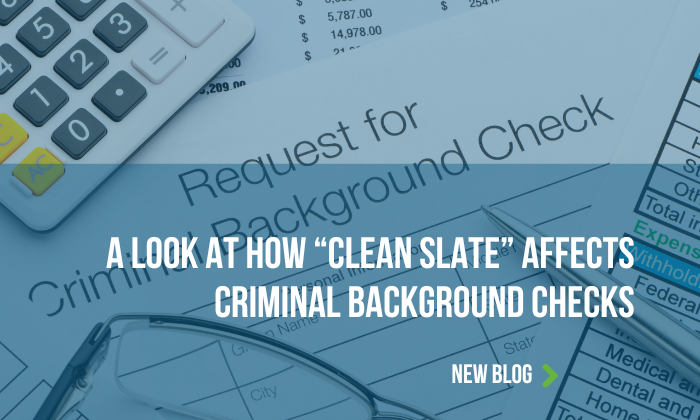In the realm of criminal justice reform, the concept of a “Clean Slate” has gained significant attention and traction in recent years. Clean Slate policies aim to provide individuals with the opportunity for a fresh start by limiting public access to their criminal records. As the movement gains momentum, it is crucial to examine how Clean Slate affects the process of conducting criminal background checks.
Understanding Clean Slate
A. Explaining the concept of Clean Slate:
Clean Slate refers to a legal framework or policy that allows individuals with certain types of criminal records to have their records expunged or sealed from public view. The intention behind Clean Slate policies is to provide individuals with a fresh start and remove barriers that hinder their reintegration into society. It offers an opportunity for those who have made mistakes in the past to rebuild their lives without the burden of their criminal history affecting future opportunities.
B. How Clean Slate policies differ across jurisdictions:
Clean Slate policies can vary significantly from one jurisdiction to another. Some jurisdictions have implemented automatic or semi-automatic processes that expunge or seal certain eligible records after a specified period of time, while others require individuals to petition the court for record clearance. The eligibility criteria, waiting periods, and types of offenses that qualify for Clean Slate can also differ, depending on the jurisdiction. It is important to understand the specific laws and regulations in a particular jurisdiction to assess the impact of Clean Slate on criminal background checks.
C. Objectives and motivations behind implementing Clean Slate laws:
The objectives of Clean Slate laws are twofold: to offer individuals with criminal records a chance to overcome the barriers they face in employment, housing, and other areas, and to promote public safety and rehabilitation. By enabling individuals to reintegrate into society more seamlessly, Clean Slate policies aim to reduce recidivism rates and promote positive outcomes for both individuals and communities. Additionally, proponents argue that Clean Slate can help address issues of inequity and fairness in the criminal justice system by offering individuals a path towards redemption and equal opportunities.
The Impact on Criminal Background Checks
1. Changes in access to criminal records:
Clean Slate policies can have a significant impact on the accessibility of an individual’s criminal records during background checks. Depending on the jurisdiction and the specifics of the Clean Slate policy, certain eligible offenses may be expunged or sealed from public view, making them inaccessible to employers or other entities conducting background checks. This can result in a limited scope of information available to employers and potentially alter their perception of an individual’s criminal history.
2. Expungement and record sealing processes:
Clean Slate policies typically involve expungement or record-sealing processes. Expungement refers to the complete erasure of a criminal record, while record sealing involves restricting access to the records. These processes effectively remove or restrict the visibility of past convictions, arrests, or other criminal records. As a result, background checks conducted after the implementation of Clean Slate may not reveal certain offenses or may only provide limited information, depending on the jurisdiction’s specific policies.
3. Potential limitations and exceptions in background checks:
Despite Clean Slate policies, there are certain limitations and exceptions that can impact the outcome of background checks. For instance, certain professions and industries, such as healthcare or law enforcement, may have statutory requirements that necessitate disclosure of past offenses regardless of Clean Slate laws. Additionally, law enforcement agencies or certain government entities may still retain access to expunged or sealed records for specific purposes. It is essential for employers and individuals alike to be aware of these limitations and exceptions to ensure compliance with relevant regulations and hiring practices.
Effects on Employment
1. How Clean Slate affects job applicants with criminal records:
Clean Slate policies can have a transformative effect on the employment prospects of individuals with criminal records. By expunging or sealing certain offenses, Clean Slate offers individuals an opportunity to present themselves to potential employers without the stigma of their past actions. It allows them to compete on a level playing field with other job applicants and be evaluated based on their qualifications, skills, and merits rather than their criminal history.
2. Balancing employer concerns and fair hiring practices:
Clean Slate policies raise important considerations regarding the balance between employer concerns and fair hiring practices. Employers have a legitimate interest in creating safe work environments and mitigating risks associated with hiring individuals with criminal records. However, Clean Slate aims to promote fair opportunities for individuals seeking reintegration and second chances. Striking the right balance involves careful evaluation of the nature of the offense, its relevance to the job position, recency, and the individual’s demonstrated rehabilitation.
3. Opportunities for individuals seeking reintegration and second chances:
Clean Slate policies can provide individuals with criminal records the opportunity to reintegrate into society by securing employment. The removal or limited visibility of their past offenses allows them to demonstrate their skills, abilities, and personal growth without the constant shadow of their criminal history. This, in turn, opens doors for economic stability, self-sufficiency, and the potential for a positive future.
Implications for Public Safety
1. Debates surrounding Clean Slate and public safety concerns:
Clean Slate policies have sparked debates regarding their potential impact on public safety. Critics argue that limiting access to an individual’s criminal records may hinder employers’ ability to make informed hiring decisions and potentially compromise workplace safety. They express concerns that certain offenses or patterns of behavior might be overlooked, leading to potential risks for employers and the broader community. On the other hand, proponents contend that Clean Slate policies support rehabilitation efforts and reduce recidivism rates, ultimately contributing to long-term public safety.
2. Evaluating the effectiveness of Clean Slate policies:
Assessing the effectiveness of Clean Slate policies in promoting public safety requires comprehensive research and evaluation. Studies have examined the relationship between expungement or record sealing and recidivism rates, providing insights into the potential benefits of Clean Slate. While research has shown promising outcomes in terms of reducing reoffending, ongoing evaluation and analysis are necessary to understand the long-term effects and address any potential challenges or unintended consequences.
3. Research and case studies on recidivism rates and rehabilitation:
Numerous studies and case studies have explored the impact of Clean Slate policies on recidivism rates and rehabilitation efforts. These research efforts shed light on the potential benefits of Clean Slate in terms of reducing the likelihood of individuals reengaging in criminal behavior. They provide valuable evidence that supports the argument for providing individuals with a fresh start and enabling them to reintegrate into society as law-abiding citizens.
Legal Considerations
A. Legal rights and protections for individuals seeking Clean Slate:
Individuals seeking Clean Slate typically have legal rights and protections in place to facilitate the expungement or sealing of their criminal records. These rights may include the right to petition the court for record clearance, the right to legal representation during the process, and the right to privacy regarding their expunged or sealed records. Understanding these legal rights is essential for individuals navigating the Clean Slate process and ensuring their rights are upheld.
B. Understanding eligibility criteria and application processes:
Clean Slate laws often outline specific eligibility criteria that individuals must meet to qualify for record expungement or sealing. These criteria may include factors such as the type of offense, the time that has passed since the conviction, and the individual’s subsequent criminal history. It is crucial to understand the eligibility criteria and application processes established by the jurisdiction to determine whether an individual is eligible for Clean Slate and how to proceed with the application.
C. Exploring the role of legal professionals in Clean Slate proceedings:
Legal professionals, including attorneys and advocates specializing in criminal law, play a significant role in Clean Slate proceedings. They can provide guidance and support to individuals seeking record clearance, ensuring compliance with legal requirements, and navigating the complexities of the process. Engaging the services of a legal professional knowledgeable in Clean Slate laws can help individuals understand their rights, assess their eligibility, and effectively navigate the legal proceedings involved.
Potential Challenges and Criticisms
A. Identifying potential challenges in implementing Clean Slate policies:
Implementing Clean Slate policies can present various challenges. One of the key challenges is determining the eligibility criteria and developing a fair and consistent process for record expungement or sealing. Ensuring the accuracy and completeness of records, addressing potential data privacy concerns, and establishing effective mechanisms for the expungement or sealing of records are additional challenges that policymakers and legal systems need to address.
B. Balancing the rights of individuals with public safety concerns:
One of the primary criticisms of Clean Slate policies is the potential tension between protecting the rights of individuals seeking record clearance and addressing public safety concerns. Critics argue that limiting access to an individual’s criminal history may compromise the ability of employers and others to make informed decisions that prioritize safety. Striking the right balance between individual rights and public safety is a critical challenge that policymakers face when implementing Clean Slate policies.
C. Addressing potential biases or unintended consequences:
There are concerns that Clean Slate policies may inadvertently perpetuate biases or create unintended consequences. Critics argue that individuals from marginalized communities may face disproportionate barriers when seeking record clearance due to various factors such as limited access to legal resources, bias within the criminal justice system, or disparities in the application of Clean Slate laws. Addressing these potential biases and unintended consequences is vital to ensure that Clean Slate policies promote equity and fairness for all individuals seeking reintegration.
Enactment of Clean Slate Laws
Clean Slate laws have been enacted in 12 states, including Pennsylvania, Utah, New Jersey, Michigan, Connecticut, Delaware, Virginia, Oklahoma, Colorado, California, Minnesota, and New York. These laws automatically expunge or seal criminal records after a specific time, improving opportunities for individuals with criminal records. The Clean Slate Initiative estimates that around 14 million people in the USA could benefit from these laws.
Studies show that employers are more likely to hire someone with an expunged record. While challenges and variations exist, the growing movement for Clean Slate laws aims to provide a fresh start and second chances for individuals, promoting rehabilitation and reducing recidivism rates. Advocating for nationwide adoption of Clean Slate laws is important for a more equitable society.
Conclusion
Clean Slate policies have emerged as a transformative approach to address the impact of criminal records on individuals seeking reintegration and second chances. By expunging or sealing certain offenses, Clean Slate aims to provide individuals with a fresh start and remove barriers that hinder their access to employment and other opportunities. While these policies have the potential to positively impact the lives of individuals with criminal records, they also raise important considerations regarding public safety, fair hiring practices, and the challenges of implementation.
Striking a balance between individual rights and public safety remains a crucial aspect of Clean Slate policies. Ongoing evaluation, research, and collaboration among policymakers, legal professionals, and stakeholders are necessary to ensure the efficacy and fairness of Clean Slate as a tool for rehabilitation and reintegration. By understanding the multifaceted effects of Clean Slate on criminal background checks, we can foster a more inclusive society that supports the principles of justice, second chances, and equal opportunities for all.
Securecheck360
At Securecheck360, we specialize in providing comprehensive Employment Background Screening Services to businesses of all sizes, both nationally and internationally. Our tailored solutions are designed to cater to the specific needs of Small, Mid-Size, and Large organizations, ensuring that they have the necessary tools and information to make informed hiring decisions.
To learn more about our services, book your free demo today!







